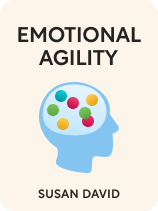
Are you a bottler? Do you tend to hide your emotions away and pretend they’re not there?
It’s only natural to want to avoid feeling negative emotions. The problem is that ignoring them doesn’t make them go away; it only allows them to pile up until they can’t be contained any longer. In Emotional Agility, clinical psychologist and management consultant Susan David discusses the problems associated with bottling emotions.
Read more to understand how bottled emotions are a ticking time bomb.
Bottling Emotions
Bottling emotions is an attempt to avoid feeling or acknowledging negative feelings that arise from your inner narratives. Bottlers believe that only weak people are affected by emotions and choose to reject them. David explains that you can ignore your emotions temporarily, but they’ll grow stronger as you push them away—until they eventually explode.
For example, after many months of bottling hurt at your spouse’s tendency to forget important events, you unexpectedly blow up at them for forgetting to pick up garlic at the store as you asked.
(Shortform note: While studies seem to support the idea that emotional repression may be linked to heightened aggression—or, in some cases, violent behavior—it’s worth noting that the “explosion” may not always affect others. As Dr. John Sarno explains in The Mindbody Prescription, bottled emotions—especially the emotion of rage—can manifest in chronic, sometimes debilitating, physical pain.)
Moreover, when you bottle emotions, you miss out on the ways emotions can be valuable. Remember that your emotions not only help you avoid danger, but they can also allow you to thrive. For example, working a dead-end job might frustrate you because you believe the narrative that you deserve more fulfilling work. Bottling that frustration so that you don’t feel daily discomfort can also leave you unmotivated to find something better.
(Shortform note: Many people associate the idea that emotions are weakness (and that emotionlessness is strength) with Stoicism, an ancient Roman philosophy that’s regaining popularity today. However, this is a mistaken interpretation of the philosophy. Stoicism advocates creating your best possible life by using logic to free yourself from the control of your emotions and choosing to live wisely and courageously. In fact, Stoicism teaches that some emotions, like feeling joy in the presence of a loved one, are a valuable part of life.)

———End of Preview———
Like what you just read? Read the rest of the world's best book summary and analysis of Susan David's "Emotional Agility" at Shortform.
Here's what you'll find in our full Emotional Agility summary:
- Why most people react instinctively rather than objectively
- How to live according to your values to create the life you want
- How to handle your emotions better using mindfulness techniques






